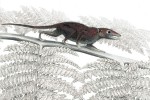
Fossils of a 160-million-year-old mammal found in China show us a placental mammal that is 35 million years older than any found before. This tiny animal is named
Juramaia sinensis, or “Jurassic mother from China.”
With forepaws adapted to climbing trees, the new-found eutherian scurried about temperate Jurassic forests feasting on insects under the cover of darkness. This diet allowed J. sinensis to tip the scales at around half an ounce (15 grams), making the creature lighter than a chipmunk.
“The great evolutionary lineage that includes us had a very humble beginning, in terms of body mass,” said Zhe-Xi Luo, a paleontologist at the Carnegie Museum of Natural History in Pittsburgh, who led the team that discovered the fossil.
Although this discovery helps us fill in the blanks of mammals’ evolutionary timeline, the reason for the split between placental mammals and marsupials is still a mystery.
 Fossils of a 160-million-year-old mammal found in China show us a placental mammal that is 35 million years older than any found before. This tiny animal is named Juramaia sinensis, or “Jurassic mother from China.”
Fossils of a 160-million-year-old mammal found in China show us a placental mammal that is 35 million years older than any found before. This tiny animal is named Juramaia sinensis, or “Jurassic mother from China.”
No comments:
Post a Comment